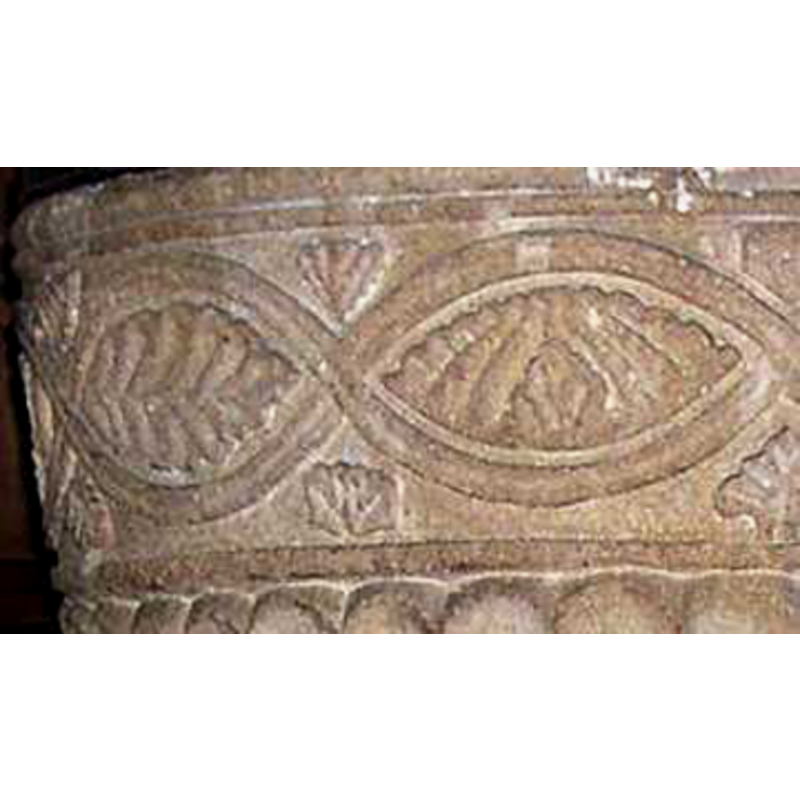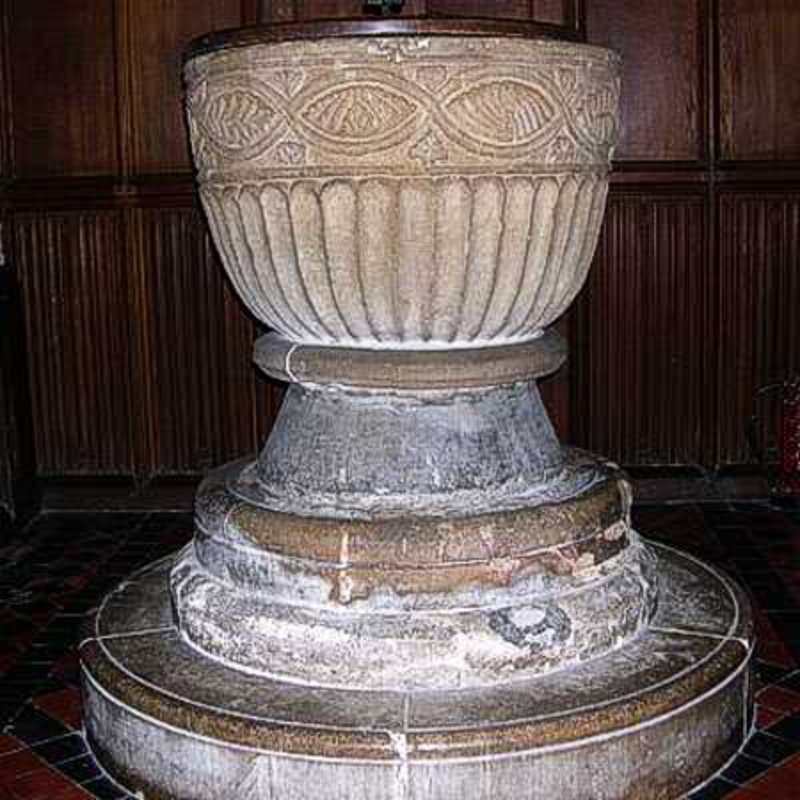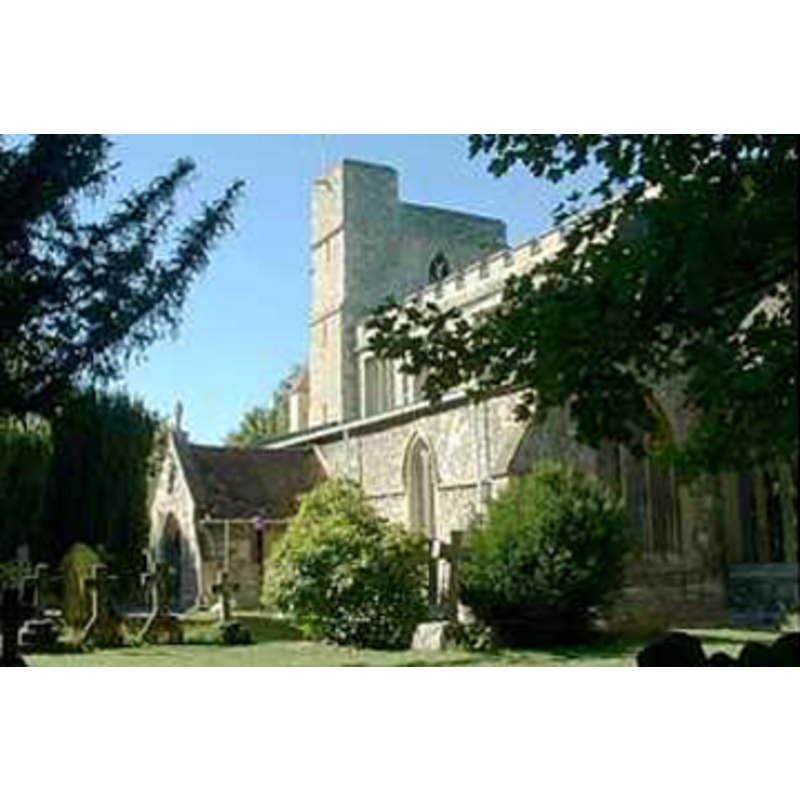Monks Risborough / Easteran Hrisanbyrge / Hriseberga / Monekenrisbourgh / Monks Rysborough / Munken Ryseberg / Parva Risborwe / Parva Risenburgh / Risborough Priors / Riseberge / Risebergh / Risenbeorgas

Image copyright © Ken Goodearl, 2007
Permission received (e-mail of 29 Oct 2007)
Results: 11 records
design element - motifs - moulding
Copyright Statement: Image copyright © Ken Goodearl, 2007
Image Source: digital photograph by Ken Goodearl [http://www.petergoodearl.co.uk/ken/aylesburyfonts/aylesburyfont_pics.htm#aylesbury] [accessed 31 October 2007]
Copyright Instructions: Permission received (e-mail of 29 Oct 2007)
design element - motifs - vine - acanthus
Copyright Statement: Image copyright © Ken Goodearl, 2007
Image Source: digital photograph by Ken Goodearl [http://www.petergoodearl.co.uk/ken/aylesburyfonts/aylesburyfont_pics.htm#aylesbury] [accessed 31 October 2007]
Copyright Instructions: Permission received (e-mail of 29 Oct 2007)
design element - patterns - fluted
Copyright Statement: Image copyright © Ken Goodearl, 2007
Image Source: digital photograph by Ken Goodearl [http://www.petergoodearl.co.uk/ken/aylesburyfonts/aylesburyfont_pics.htm#aylesbury] [accessed 31 October 2007]
Copyright Instructions: Permission received (e-mail of 29 Oct 2007)
view of church exterior - southeast view
Copyright Statement: Image copyright © Ken Goodearl, 2007
Image Source: digital photograph by Ken Goodearl [http://www.petergoodearl.co.uk/ken/aylesburyfonts/aylesburyfont_pics.htm#aylesbury] [accessed 31 October 2007]
Copyright Instructions: Permission received (e-mail of 29 Oct 2007)
design element - motifs - roll moulding
Copyright Statement: Image copyright © Ken Goodearl, 2007
Image Source: digital photograph by Ken Goodearl [http://www.petergoodearl.co.uk/ken/aylesburyfonts/aylesburyfont_pics.htm#aylesbury] [accessed 31 October 2007]
Copyright Instructions: Permission received (e-mail of 29 Oct 2007)
design element - motifs - roll moulding
Copyright Statement: Image copyright © Ken Goodearl, 2007
Image Source: digital photograph by Ken Goodearl [http://www.petergoodearl.co.uk/ken/aylesburyfonts/aylesburyfont_pics.htm#aylesbury] [accessed 31 October 2007]
Copyright Instructions: Permission received (e-mail of 29 Oct 2007)
view of font and cover
Copyright Statement: Image copyright © Martin Beek, 2005
Image Source: detail of a digital photograph in FLICKR [www.flickr.com/photos/oxfordshire_church_photos] taken by Martin Beek on 24 October 2005
Copyright Instructions: PERMISSION NOT AVAILABLE -- IMAGE NOT FOR PUBLIC USE
view of basin
Copyright Statement: Image copyright © Martin Beek, 2005
Image Source: digital photograph in FLICKR [www.flickr.com/photos/oxfordshire_church_photos] taken by Martin Beek on 24 October 2005
Copyright Instructions: PERMISSION NOT AVAILABLE -- IMAGE NOT FOR PUBLIC USE
view of font in context
Copyright Statement: Image copyright © Martin Beek, 2005
Image Source: digital photograph in FLICKR [www.flickr.com/photos/oxfordshire_church_photos] taken by Martin Beek on 24 October 2005
Copyright Instructions: PERMISSION NOT AVAILABLE -- IMAGE NOT FOR PUBLIC USE
view of church interior - nave - looking west
Copyright Statement: Image copyright © Martin Beek, 2005
Image Source: digital photograph in FLICKR [www.flickr.com/photos/oxfordshire_church_photos] taken by Martin Beek on 24 October 2005
Copyright Instructions: PERMISSION NOT AVAILABLE -- IMAGE NOT FOR PUBLIC USE
view of basin - detail
Copyright Statement: Image copyright © Martin Beek, 2005
Image Source: detail of a digital photograph in FLICKR [www.flickr.com/photos/oxfordshire_church_photos] taken by Martin Beek on 24 October 2005
Copyright Instructions: PERMISSION NOT AVAILABLE -- IMAGE NOT FOR PUBLIC USE
INFORMATION
Font ID: 01336RIS
Object Type: Baptismal Font1
Font Century and Period/Style: 12th - 13th century [base 13thC?] [composite font], Medieval / composite
Workshop/Group/Artisan: Aylesbury group
Cognate Fonts: Great Kimble, Little Misenden, Bledlow -- similar bases at Buckland and Dinton, all near Aylesbury
Church / Chapel Name: Parish Church of St. Dunstan
Font Location in Church: Inside the church, in the W end, centre aisle, just E of the tower arch
Church Patron Saint(s): St. Dunstan
Church Address: Mill Ln, Monks Risborough HP27 9JE, United Kingdom -- Tel.: +44 1844 275944
Site Location: Buckinghamshire, South East, England, United Kingdom
Directions to Site: Located between Princes Risborough and Great Kimble, 8 km SW of Wendover, 11 km SW of Aylesbury
Ecclesiastic Region: Diocese of Oxford [originally in the Diocese of Canterbury]
Historical Region: Hundred of Risborough
Additional Comments: altered font? / composite font (12thC basin on 13thC base)
Font Notes:
Click to view
There is an entry for [Monks] Risborough [variant spelling] in the Domesday survey [http://opendomesday.org/place/SP8004/monks-risborough/] [accessed 24 September 2015], but it mentions neither cleric nor church in it, except the lord and tenant-in-chief, both in 1066 and 1086, the archbishop of Canterbury. Batty (1848) notes it as one of the type of the font at Aylesbury St. Mary's. Parker (1850) refers to an engraving in Lipscomb (vol. ii, p. 421). Described in Sheahan (1862): "The font is Norman, large, curious, cup-shaped, and fluted." In Murray *(1882). Described in Cox & Harvey (1907) as a chalice-shaped font of the Norman period, "obviously done by the same workman or workmen" as the fonts at Little Missenden, Great Kimble and Bledlow. Pevsner (1960) has it as the same type as the fonts of the Aylsbury group. The Victoria County History (Buckingham, vol. 2, 1908) notes: "The font is of the local 12th-century type, with a circular scalloped bowl, moulded stem, and square base, ornamented with conventional foliage." Noted and illustrated n the CRSBI (2015): "Aylesbury type font with an original bowl but a 13thc base [...] The Monks Risborough font is unusual in that its bowl and collar are of a hard, shelly stone rather than the normal soft clunch, and this may explain the relative shallowness of the carving and the lack of decoration on the collar. The presence of a stem is unusual in the group. It is in a different stone (clunch) and is probably 13thc like the water-holding base and the plinth. There are close similarities with the font at Bledlow, and Pevsner suggests that both are by the same carver. The decoration of the upper band is perhaps best understood as a simplification of the more deeply carved and sophisticated forms of the Great Kimble font." [NB: the main difference between this font and the others in this group is the base: whereas tha basin here follows the usual design with the upper vine and the lower fluted pattern, the base is not the usual cushion-capital base, but a fairly plain circular moulded affair. There are two other Aylesbury-group fonts with a similar base: those at Buckland and Dinton]. There are several drilled holes and some damage to the upper rim, perhaps from the anchors of the old font cover.
Credit and Acknowledgements: We are grateful to Ken Goodearl, of [www.petergoodearl.co.uk], for his photographs of church and font
COORDINATES
UTM: 30U 650153 5733518
Latitude & Longitude (Decimal): 51.732442, -0.825611
Latitude & Longitude (DMS): 51° 43′ 56.79″ N, 0° 49′ 32.2″ W
MEDIUM AND MEASUREMENTS
Material: stone, type unknown
Font Shape: chalice-shaped, hemispheric, mounted
Basin Interior Shape: round
Basin Exterior Shape: round
Drainage Notes: lead-lined
Rim Thickness: 12 cm [calculated]
Diameter (inside rim): 61 cm*
Diameter (includes rim): 85 cm*
Basin Total Height: 54 cm*
Font Height (less Plinth): 96 / 109 cm*
Notes on Measurements: * CRSBI (2015)
LID INFORMATION
Date: modern?
Material: wood
Apparatus: no
Notes: flat and round; appears modern [cf. FontNotes]
REFERENCES
- Victoria County History [online], University of London, 1993-. URL: https://www.british-history.ac.uk.
- Batty, Robert Eaton, Some particulars connected with the history of baptismal fonts: being a paper read at the quarterly general meeting of the Architectural and Archaeological Society for the County of Buckingham, London: F. & J. Rivington, 1848, unpaged
- Corpus of Romanesque Sculpture in Britain and Ireland, The Corpus of Romanesque Sculpture in Britain and Ireland, The Corpus of Romanesque Sculpture in Britain and Ireland. URL: http://www.crsbi.ac.uk.
- Cox, John Charles, English Church Furniture, New York: E.P. Dutton & Co., 1907, p. 187
- Murray, John [the firm], Handbook for travellers in Berks. Bucks and Oxfordshire, including a [...], London: John Murray, 1882, p. 133
- Parker, John Henry, The Ecclesiastical and architectural topography of England: Oxfordshire, Oxford, London: Published under the sanction of the Central Commitee of the Archaeological Institute of Great Britain and Ireland [by] John Henry Parker, 1850, [entry no.] 197
- Pevsner, Nikolaus, Buckinghamshire, Harmondsworth: Penguin, 1960, p. 19
- Sheahan, James Joseph, History and topography of Buckinghamshire, comprising a general survey of the county, preceded by an epitome of the early history of Great Britain, London; Pontefract: Longman, Green, Longman, and Roberts; William Edward Bonas [...], 1862, p. 186


